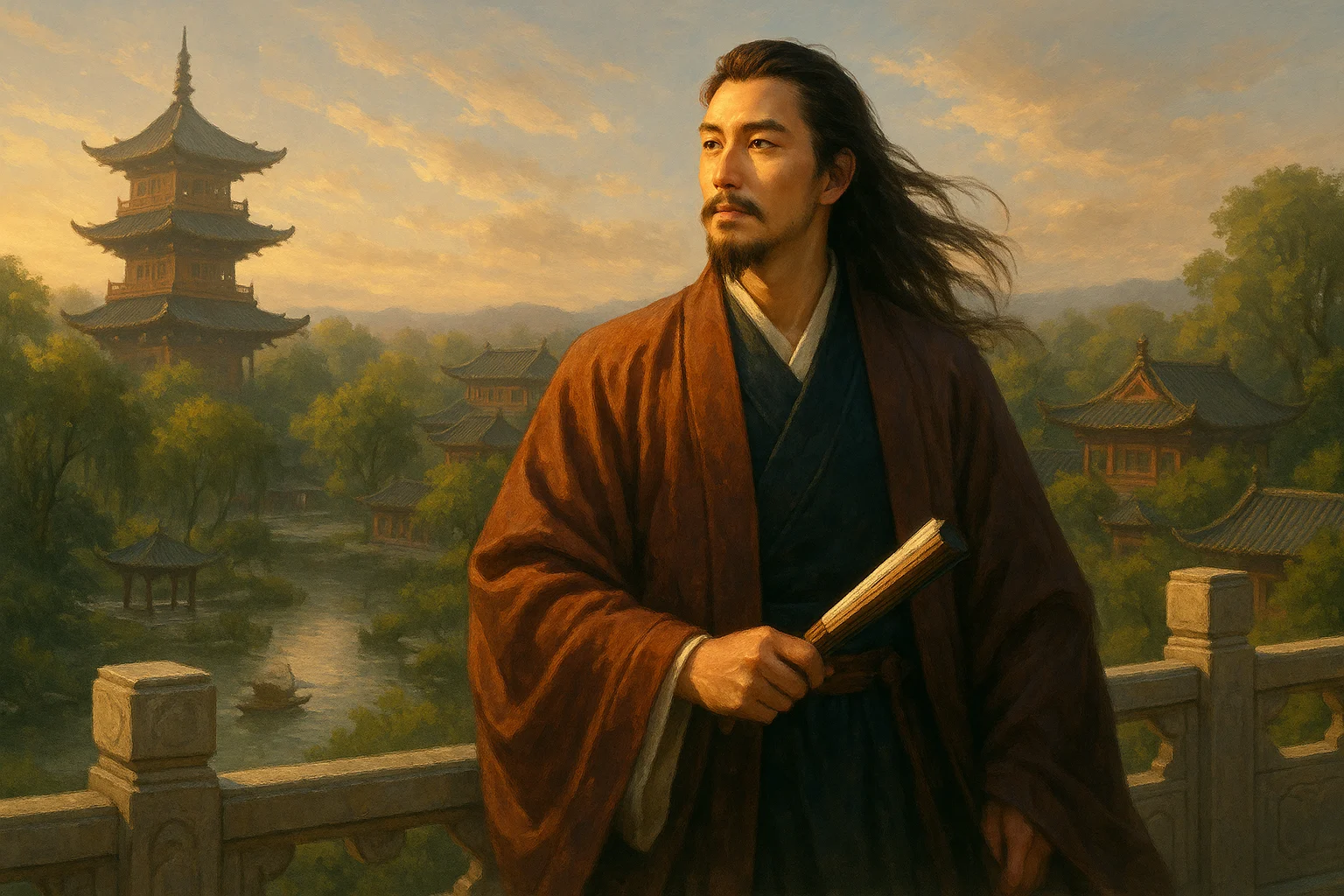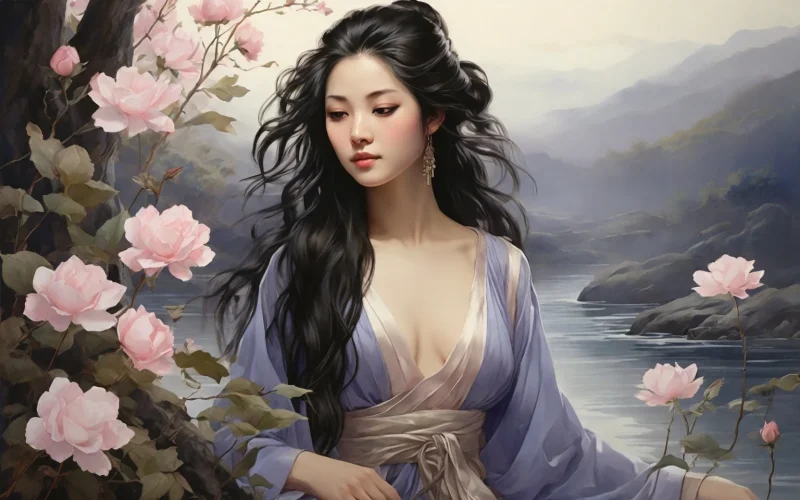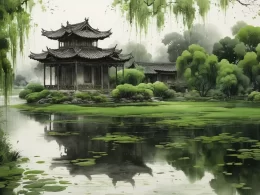By water, countless cotton roses glow,
Dawn's rouge not yet steeped in petals' flow.
Like a tipsy belle with mirrored strife,
Reluctantly raising her makeup life.
Original Poem
「木芙蓉」
王安石
水边无数木芙蓉,露染燕脂色未浓。
正似美人初醉著,强抬青镜欲妆慵。
Interpretation
Composed during Wang Anshi's later years in seclusion at Zhongshan, this poem reflects his tranquil state of mind after retiring to Jiangning (modern Nanjing). His poetic style matured into refined elegance during this period. Inspired by the sight of blooming hibiscus by the water's edge during his mountain retreat, the poem draws lyrical parallels between the flower's beauty and feminine grace, creating a vivid and delicate tableau that reveals the poet's keen observation of nature's aesthetics and human charm.
First Couplet: "水边无数木芙蓉,露染燕脂色未浓。"
Shuǐ biān wú shù mù fú róng, lù rǎn yān zhī sè wèi nóng.
Countless hibiscus grace the water's edge,
their petals, dew-kissed, blush with dawn's faint rouge.
The opening couplet establishes the setting with botanical precision—"hibiscus by water" (木芙蓉) specifies the species and habitat, while "countless" (无数) suggests lush abundance. "Dew-kissed blush" (露染燕脂) personifies morning dew as an artist's brush applying subtle cosmetics, with "faint rouge" (色未浓) evoking the delicate coloration of both flower and imagined maiden. This chromatic restraint artfully sets the stage for the subsequent metaphorical transformation.
Second Couplet: "正似美人初醉著,强抬青镜欲妆慵。"
Zhèng sì měi rén chū zuì zhuó, qiáng tái qīng jìng yù zhuāng yōng.
Like a maiden newly warmed by wine,
lifting her bronze mirror with languid grace.
Here, the poet's gaze shifts from botanical observation to anthropomorphic vision. The hibiscus metamorphoses into a tipsy beauty, with "newly warmed by wine" (初醉著) capturing the flower's flushed delicacy and human vulnerability. "Lifting her bronze mirror" (强抬青镜) introduces an intimate domestic artifact, while "languid grace" (欲妆慵) conveys the paradoxical energy of indolent elegance—a woman (and by extension, the flower) caught between the impulse to adorn and the pleasure of repose.
Holistic Appreciation
This miniature masterpiece achieves remarkable conceptual unity through its floral-feminine metamorphosis. Departing from his characteristic vigorous style, Wang crafts a work of exceptional subtlety where botanical accuracy blends seamlessly with human analogy. The first couplet's objective description ("dew-kissed blush") evolves into the second's subjective projection ("tipsy maiden"), creating a dynamic interplay between observation and imagination.
The hibiscus' "unintensified rouge" (色未浓) mirrors the maiden's "unfinished toilette" (妆慵), while the flower's natural habitat by water parallels the woman's domestic space with her mirror. This structural symmetry elevates the poem beyond mere simile into the realm of symbolic equivalence—nature and culture reflecting each other's essential grace. The work's brilliance lies in its restrained suggestiveness; every detail (the dew, the rouge, the mirror) serves dual descriptive and metaphorical functions.
Artistic Merits
- Metamorphic imagery
The seamless transformation of hibiscus into maiden demonstrates Wang's mastery of "scenery as sentiment" (情景交融), where natural observation becomes psychological revelation. - Chromatographic subtlety:
The incremental coloration from "faint rouge" to "wine-flushed cheeks" creates a painterly progression that mirrors the poem's thematic development. - Domestic naturalism
The bronze mirror—a quintessential feminine object—grounds the metaphor in Tang-Song material culture while elevating the flower's beauty through human ritual. - Rhythmic languor
The deliberate pacing of "lifting… with languid grace" (强抬…欲妆慵) mimics both the flower's drooping posture and the maiden's indolent movement.
Insights
Wang's poem reveals the profound interconnectedness of aesthetic and existential perception. By envisioning hibiscus as a drowsy beauty, he demonstrates how nature's forms subconsciously shape our understanding of human qualities. The work suggests that true observation is always participatory—we cannot see a flower without seeing ourselves reflected in it.
For contemporary readers, this poem offers a meditation on attention itself. In an age of fragmented focus, it reminds us that profound appreciation demands both scientific precision ("countless hibiscus") and imaginative surrender ("maiden warmed by wine"). The hibiscus becomes a mirror not just for the imagined woman, but for the poet's—and by extension, the reader's—capacity to find the universal in the particular. Wang's genius lies in making this epistemological truth feel as natural as morning dew on petals.
About the Poet

Wang Anshi (王安石 1021 - 1086), a native of Linchuan in Jiangxi, was an outstanding statesman, writer, and thinker of the Northern Song Dynasty, counted among the "Eight Great Prose Masters of the Tang and Song Dynasties." His poetic achievements were particularly profound—his early works, filled with heroic language, revealed the ambition of a reformer. Though his ci poetry was few in number, it pioneered new realms of historical reflection. His poetry and prose combined intellectual depth with artistic value, and the over 1,500 works preserved in The Collected Works of Linchuan stand as a monumental testament to literary innovation in Song Dynasty literature.












